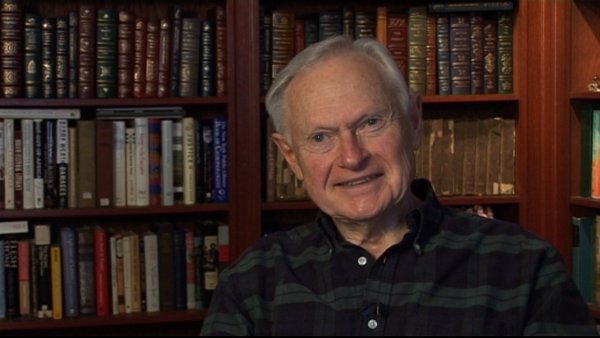NEXT STORY

Meeting Sarah, my second wife
RELATED STORIES

NEXT STORY

Meeting Sarah, my second wife
RELATED STORIES


|
Views | Duration | |
|---|---|---|---|
| 11. I get accepted to Johns Hopkins School | 434 | 02:50 | |
| 12. 'This is where I belong': Yale School of Medicine | 427 | 04:38 | |
| 13. 'Shhh, those are the Protestants!' | 1 | 445 | 02:59 |
| 14. Why surgery wasn't my thing | 434 | 01:55 | |
| 15. How Robert A Chase changed my life | 1 | 484 | 04:58 |
| 16. I meet my first wife | 824 | 03:17 | |
| 17. Depression | 758 | 05:09 | |
| 18. Meeting Sarah, my second wife | 815 | 03:55 | |
| 19. 'Next time get a better room!' | 598 | 03:26 | |
| 20. Breaking up with Sarah | 1143 | 03:56 |


It took a huge toll… on me… and in seven years, I knew there had to be a divorce. I knew it wasn't going to work.
But I thought, I've got to make it work. You know, I'm the guy who doesn't fail. Everything has to be fine. But after that seven years, it was never quite the same. And I got more and more depressed. I don't want to say I'm attributing my depression to that. I think it had been a lot of stuff gradually coming on. In any event, I was getting more and more depressed, and she and I were having more and more trouble, and eventually I became so depressed I was non-functional. And my brother came up to New Haven and I was admitted to the psychiatric unit of the New Haven Hospital, and assured that, within 30 days, I'd be out of there and fine. Well, that was a crock of stool, because I was worse at the end of 30 days, but I was discharged anyway. I lived on my own for a while. They readmitted me, and then they realised I needed long-term hospitalization. But by that time, I was incapable of caring for myself, incapable of doing anything. And I was admitted to a… because of insurance I had. I'd been wise enough, when I started practice, to get this really wonderful health insurance. I was admitted to a large… private psychiatric hospital in Hartford, called the Institute of Living.
It had been originally an endowed place, called the Hartford Retreat, going back to the 1840s, and now it was this large campus, many buildings, many facilities. And when I was admitted, the team of senior psychiatrists who saw me couldn't figure out what they were going to do with me, what kind of treatment I could possibly have, because I was not only depressed, but I was severely obsessive and compulsive behaviour and all this sort of stuff.
Well, it turned out that the Hartford Hospital was associated with this… large psychiatric facility, and one of the leaders in prefrontal lobotomy, which was very popular at one point, but starting to fade at that time, when I was admitted there in 1973. They said that I should have a prefrontal lobotomy.
Well, you know, when you go into a teaching hospital, you're assigned to a resident. And the first day I met the resident assigned to me, and he was from Italy. He'd gone to medical school at the University of Bologna, and I was such a fancy guy that I would look down on all foreign graduates. And he had a thick accent. He spoke perfect English, but he had a thick accent. It's only a little thinner today. And he's the resident. He's 27 years old, I was 43. And he took my history and he talked to me for about an hour, and I later discovered that… you know, he had to present me to the board, who had already made up their mind that I should have a lobotomy.
And he said, you know this man's real-world problem is not the obsessional thinking and the fact that he's got crazy ideas about things. He's just severely, severely depressed, and the best treatment for depression is electric shock therapy. And they said, no, no, no, no, he has to have a lobotomy, and Vittorio Ferraro, which was his name, is his name, said, well, this is a terrible mistake and I won't stand by and see it happen. You know, this guy, he's a doctor, he's on the Yale faculty, he's this, he's that. You can't. You just can't make a slice in his brain. And if you do, I'm going to quit. I'm just not going to stay here.
Well, he was a young person, as I put it in this book that I later wrote, very highly thought of in that place. And they said, well, let's humour him. We'll give this guy a series of electroshock treatments. And that did it. I recovered.
Sherwin Nuland (1930-2014) was an American surgeon and author who taught bioethics, the history of medicine, and medicine at the Yale University School of Medicine. He wrote the book How We Die which made The New York Times bestseller list and won the National Book Award. He also wrote about his own painful coming of age as a son of immigrants in Lost in America: A Journey with My Father. He used to write for The New Yorker, The New York Times, Time, and the New York Review of Books.
Title: Depression
Listeners: Christopher Sykes
Christopher Sykes is a London-based television producer and director who has made a number of documentary films for BBC TV, Channel 4 and PBS.
Tags: New Haven Hospital, The Institute of Living, Hartford Hospital, Connecticut, Vittorio Ferrero
Duration: 5 minutes, 9 seconds
Date story recorded: January 2011
Date story went live: 13 September 2011